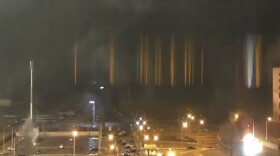
Geoff Brumfiel
Geoff Brumfiel works as a senior editor and correspondent on NPR's science desk. His editing duties include science and space, while his reporting focuses on the intersection of science and national security.
From April of 2016 to September of 2018, Brumfiel served as an editor overseeing basic research and climate science. Prior to that, he worked for three years as a reporter covering physics and space for the network. Brumfiel has carried his microphone into ghost villages created by the Fukushima nuclear accident in Japan. He's tracked the journey of highly enriched uranium as it was shipped out of Poland. For a story on how animals drink, he crouched for over an hour and tried to convince his neighbor's cat to lap a bowl of milk.
Before NPR, Brumfiel was based in London as a senior reporter for Nature Magazine from 2007-2013. There, he covered energy, space, climate, and the physical sciences. From 2002 – 2007, Brumfiel was Nature Magazine's Washington Correspondent.
Brumfiel is the 2013 winner of the Association of British Science Writers award for news reporting on the Fukushima nuclear accident.
-
The satellite image lends credence to the idea that Russia may have exposed its troops to unhealthy levels of radioactivity.
-
Images of Ukraine are flooding social media, but experts warn they don't show the full picture and can sometimes give a misleading account of the conflict on the ground.
-
An NPR analysis of security footage and photos following the attack on Europe's largest nuclear power plant shows that many of the plant's critical safety systems were in the field of Russian fire.
-
Emergency diesel generators are providing power to critical safety systems at the facility, but they have only enough fuel for 48 hours.
-
The head of the U.N. atomic watchdog says there was no release of radioactive material after a projectile hit a building at the plant facility.
-
Russian President Vladimir Putin gave orders to his nation's nuclear forces over the weekend, but their exact meaning is unclear. Russia has more nuclear weapons than any other nation.
-
An anti-vaccine group known for spreading medical disinformation is writing prescriptions for unproven COVID-19 treatments, with the help of a doctor whose medical license was revoked in Alabama.
-
A station to detect nuclear weapons tests picked up the volcanic eruption in Tonga from Antarctica. Some experts say the blast could be more than 50 megatons, while NASA estimates 6-10 megatons.
-
Researchers who have been studying the volcano since 2015 say it was likely caused by seawater flowing into a chamber filled with magma.
-
Researchers who detected environmental DNA, or eDNA, in two zoos say the technique could one day be used to look for endangered species in remote locations in the wild.








